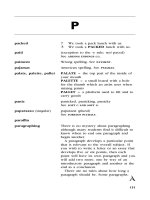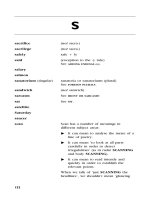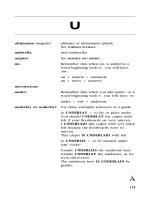Learning A Burt of Correct English_7 potx
Bạn đang xem bản rút gọn của tài liệu. Xem và tải ngay bản đầy đủ của tài liệu tại đây (219.09 KB, 17 trang )
livelihood
loaf (singular) loaves (plural)
See
PLURALS (v).
loath, loathe or loth? LOATH and LOTH are interchangeable
spellings and mean unwilling or reluctant:
IwasLOATH/LOTH to hurt his feelings.
LOATHE means to detest:
I LOATHE snobbery.
loathsome loathe + some = loathsome
This word means detestable.
loaves See
LOAF.
lonely (not lonley)
loose or lose? Use these exemplar sentences as a guide:
IhaveaLOOSE tooth. (rhymes with
moose)
Don’t LOSE your temper. (rhymes with
snooze)
loping or lopping? lope + ing = loping
He was LOPING along with long strides.
lop + ing = lopping
LOPPING the trees will just encourage
them to grow taller.
See
ADDING ENDINGS (i) and (ii).
alot (never alot)
Remember that this is a slang expression
and should never be used in a formal
context. Substitute ‘many’ or recast the
sentence altogether.
lovable/loveable Both spellings are correct.
luggage (not lugage)
112
LIVELIHOOD
luxuriant or LUXURIANT = growing abundantly
luxurious? LUXURIANT vegetation
LUXURIOUS = rich and costly,
sumptuous
a LUXURIOUS hotel
luxury
-ly Take care when adding this suffix to a
word already ending in -l. You will have
double -l:
real + ly = really
ideal + ly = ideally
special + ly = specially
usual + ly = usually
lying See
LAY OR LIE?.
LYING
113
TEAMFLY
Team-Fly
®
M
machinery (not -ary)
madam or madame? Use MADAM:
" as a polite term of respect:
Can I help you, madam?
" in letter writing:
Dear Madam (note capital letter)
" as a formal title of respect:
Thank you, Madam Speaker (note
capital letter)
Use MADAME as the French equivalent:
" We are going to Madame Tussaud’s.
" The famous French physicist, Madame
Curie, was born in Poland.
magic -e Also known as silent -e and mute -e.
See
ADDING ENDINGS (ii).
mahogany
maintain
maintenance (not maintainance)
manageable See
SOFT C AND SOFT G.
manager (not manger, as is so often written!)
mango (singular) mangoes or mangos (plural)
See
PLURALS (iv).
manoeuvre
mantelpiece (not mantle-)
mantelshelf (not mantle-)
margarine (not margerine)
114
marihuana/marijuana Both spellings are correct.
marriage
marvel marvelled, marvelling
marvellous
masterful or masterly? MASTERFUL = dominating
MASTERLY = very skilful
mathematics (not mathmatics)
mating or matting? mate + ing = mating
mat + ing = matting
See
ADDING ENDINGS (i) + (ii).
matrix (singular) matrices or matrixes (plural)
See
FOREIGN PLURALS.
may See
CAN OR MAY?.
may or might? (i) Use may/might in a present context
and might in a past context:
If I receive a written invitation, I
MAY/MIGHT accept. (still possible)
If I had received a written invitation,
I MIGHT HAVE accepted. (possibility
over now)
If I don’t hurry, I MAY/MIGHT miss
the bus. (possibility exists)
If I hadn’t hurried, I MIGHT HAVE
missed the bus. (risk now over)
(ii) Convert ‘may’ to ‘might’ when
changing direct speech to indirect or
reported speech:
‘MAY I come in?’ she asked.
She asked if she MIGHT come in.
‘You MAY be lucky,’ she said.
She said that I MIGHT be lucky.
(iii) There is a slight difference between
the meaning of ‘may’ and ‘might’ in
the present tense when they are used
in the sense of ‘asking permission’:
MAY OR MIGHT?
115
MAY I suggest that we adjourn the
meeting? (agreement assured)
MIGHT I suggest that we adjourn the
meeting? (suggestion more tentative)
me See
I/ME/MYSELF.
meant (not ment, not mean’t)
medal or meddle? MEDAL = a small metal disc given as an
honour
to MEDDLE =tointerfere
mediaeval/medieval Both spellings are correct.
medicine (not medecine) medicinal
mediocre
Mediterranean
medium (singular) media or mediums (plural)
Note, however, that the two plurals differ
in meaning.
The MEDIA hounded him to his death.
(= radio, television, newspaper journalists)
She consulted a dozen MEDIUMS in the
hope of making contact with her dead
husband. (= people through whom the
spirits of the dead are said to
communicate)
mediums See
MEDIUM.
meet, meet up, meet British English distinguishes between the
up with, or meet with? first and last of these:
You MEET aperson.
You MEET WITH an accident.
Avoid using ‘meet up’ and ‘meet up with’.
They are clumsy expressions.
When shall we MEET UP?
When shall we MEET?
We MET UP with friends in town.
We MET friends in town.
116
ME
memento (singular) mementoes or mementos (plural)
See
PLURALS (iv).
memorandum (singular) memoranda or memorandums (plural)
See FOREIGN PLURALS.
memory (singular) memories (plural)
See PLURALS (iii).
ment Wrong spelling. See
MEANT.
mention mentioned, mentioning.
Mesdames (i) Plural of French Madame.
(ii) Used as a plural title before a number
of ladies’ names:
Mesdames Smith, Green, Brown and
Kelly won prizes.
Always used with an initial capital
letter.
message
messenger (not messanger)
metaphor (not metaphore)
A metaphor is a compressed comparison:
He wolfed his food. (note the apparent
identification with a wolf’s eating habits)
Compare
SIMILE.
meteorology (six syllables)
meter or metre? Use these exemplar sentences as a guide:
Put these coins in the parking METER.
You’ll need a METRE of material to make
a skirt.
Sonnets are always written in iambic
METRE.
might See
MAY OR MIGHT?.
might of This is an incorrect construction.
See
COULD OF.
MIGHT OF
117
milage/mileage Both spellings are correct.
milieu (singular) milieus or milieux (plural)
See
FOREIGN PLURALS.
militate or mitigate? To MILITATE (against) comes from the
Latin verb meaning ‘to serve as a soldier’
and it has the combative sense of having a
powerful influence on something.
Despite his excellent qualifications, his
youthful criminal record MILITATED
against his appointment as school bursar.
To MITIGATE comes from the Latin
adjective meaning ‘mild’ and it means to
moderate, to make less severe.
Don’t condemn the young man too
harshly. There are MITIGATING
circumstances.
millennium (singular) millennia or millenniums (plural)
(not -n-)
See
FOREIGN PLURALS.
millepede/millipede Both spellings are correct.
mimic mimicked, mimicking
See
SOFT C AND SOFT G.
miniature
minuscule (not miniscule)
minute (not minuit)
miracle
miscellaneous miscellany
mischief Se e
EI/IE SPELLING RULE.
mischievous (not mischievious, as it is often
mispronounced)
misplace Se e
DISPLACE OR MISPLACE?.
misrelated participles See
PARTICIPLES.
118
MILAGE/MILEAGE
misspell mis + spell
misspelled/misspelt Both spellings are correct.
mistletoe
moccasin
modern (not modren)
moment (not momment)
momentary or MOMENTARY =lastingforonlya
momentous? very short time
MOMENTOUS = of great significance
monastery (singular) monasteries (plural)
(not monastry/monastries)
See
PLURALS (iii).
mongoose (singular) mongooses (plural)
(not mongeese)
monotonous
moping or mopping? mope + ing = moping
mop + ing = mopping
See
ADDING ENDINGS (i) + (ii).
moral or morale? Use these exemplar sentences as a guide:
Denise is guided by strong MORAL
principles.
My MORALE suffered badly when I failed
my exams and I lost all faith in myself for
years.
Morocco
mortgage (not morgage as it is pronounced)
mosquito (singular) mosquitoes (plural)
See
PLURALS (iv).
motto (singular) mottoes or mottos (plural)
See
PLURALS (iv).
mould
mouldy
MOULDY
119
moustache
mucous or mucus? MUCOUS is an adjective, as in MUCOUS
membrane.
The name of the thick secretion of the
mucous membrane is called MUCUS.
murmur murmured, murmuring (not murmer-)
mustn’t This is the contracted form of ‘must not’.
Take care to place the apostrophe
carefully.
must of This is an incorrect construction.
See
COULD OF.
mute -e Also known as magic -e and silent -e.
See
ADDING ENDINGS (ii).
mutual reciprocal
Our dislike was MUTUAL.
Their marriage is based on MUTUAL
respect.
Some would avoid the use of ‘mutual’ in
expressions such as ‘our mutual friend’
because a third person is then introduced
and the feelings of each person for the
other two are not necessarily identical. It
might be best here to describe the friend
as one ‘we have in common’.
myself See
I/ME/MYSELF.
myth See
LEGEND OR MYTH?.
120
MOUSTACHE
N
naive/naı
¨
ve Both forms are correct.
naivete
´
/naı
¨
vete
´
/ All these forms are correct.
naivety/naı
¨
vety
nationalise or to NATIONALISE =totransfer
naturalise? ownership from the private sector to the
state
to NATURALISE = to confer full
citizenship on a foreigner
nebula (singular) nebulae or nebulas (plural)
See
FOREIGN PLURALS.
necessary
necessity
negatives See
DOUBLE NEGATIVES.
neighbour See
EI/IE SPELLING RULE.
neither See EI/IE SPELLING RULE.
neither . . .nor Compare EITHER . . .OR.
nephew
-ness Take care when adding this suffix to a
word already ending in -n. You will have
double n:
cleanness
openness
suddenness
neumonia Wrong spelling. See
PNEUMONIA.
new See
KNEW OR NEW?.
niece Se e
EI/IE SPELLING RULE.
nine ninth
121
nineteen nineteenth
ninety ninetieth
no See
KNOW OR NO?.
no body or nobody? Use these exemplar sentences as a guide:
It was believed that he had been
murdered but NO BODY was ever found,
and so nothing could be proved. (= no
corpse)
NOBODY likes going to the dentist.
(= no one)
none The problem with ‘none’ is deciding
whether to use with it a singular or a
plural verb.
Strictly speaking, a singular verb should
accompany ‘none’:
NONE of the passengers WAS hurt.
(= not one)
NONE of the milk WAS spilt. (= not any)
Colloquially, a singular verb is always used
with expressions of quantity but a plural
verb is often used when plural nouns
follow the ‘none of . . .’ construction:
NONE of the passengers WERE hurt.
NONE of my friends LIKE pop music.
NONE of the children WANT an ice-
cream.
Some would reserve plural verbs in these
cases for informal occasions; others would
see them as perfectly acceptable formally
as well.
no one ‘No one’ is singular and requires a singular
verb:
NO ONE likes meanness.
‘No one’ should be written as two words
and not hyphenated.
122
NINETEEN
nosey/nosy Both spellings are correct.
Note: for informal use only.
noticeable (not noticable)
See
SOFT C AND SOFT G.
not only . . . but also Take care with the positioning of each
part of this pair:
Denise not only enjoys composing but
also conducting.
Denise enjoys two musical activities:
composing, conducting.
Put ‘not only’ in front of the first
and ‘but also’ in front of the second,
and let ‘enjoys’ refer to both.
Denise enjoys NOT ONLY composing
BUT ALSO conducting.
Compare
BOTH . . .AND; EITHER . . .OR;
NEITHER . . .NOR.
nouns There are four kinds of nouns: common,
proper, abstract and collective.
" Take care with the punctuation of
proper nouns. Because they are the
special individual names of people,
towns, countries, newspapers, days of
the week, businesses, and so on, they
require initial capital letters:
Dennis Blakely
Ipswich
Sweden
The Times
Wednesday
Blazing Fireplaces Ltd.
Note that months of the year begin
with a capital letter but the seasons
generally do not:
April, the spring, but the Spring term.
NOUNS
123
TEAMFLY
Team-Fly
®
" Do not confuse proper and common
nouns.
labrador – common noun
Tinker – proper noun (needs initial
capital)
There is a certain flexibility in
sentences like this:
Bishop Flynn will be arriving at three
o’clock. The bishop/Bishop would like
to meet the confirmation candidates
before the service begins.
" Abstract nouns arethenamesof
ideas, emotions, states of mind, and
so on.
The correct form can sometimes be
difficult to remember. Do check in a
dictionary when you are uncertain.
Abstract nouns can have a huge
variety of endings:
optimism, pride, complexity, failure,
diffidence, depth, bravery, kindness,
excitement, exhilaration, and so on
Unsophisticated writers often add
-ness to an adjective in the hope that
it will then be converted to an
abstract noun. Sometimes this works;
often it doesn’t.
" Collective nouns (audience, flock,
herd, congregation) are treated as
singular nouns if regarded as a single
whole:
The audience WAS wildly
enthusiastic.
They are treated as plural nouns when
regarded as a number of units making
up the whole:
The jury WERE divided over his guilt.
124
NOUNS
nucleus (singular) nuclei (plural)
See
FOREIGN PLURALS.
nuisance
number See
SINGULAR OR PLURAL?.
numbers Should numbers be written in figures or in
words? In mathematical, scientific,
technical and business contexts, figures are
used, as you would expect.
The problem arises in straightforward
prose (an essay, perhaps, or a short story
or a letter).
The rule of thumb is that small numbers
are written as words and large numbers
are written as figures.
What are small numbers? Some people
would say numbers up to ten; others
numbers up to twenty; others numbers up
to one hundred. If you’re not bound by
the house-style of a particular
organisation, you can make up your own
mind. Numbers up to one hundred can be
written in one or two words and this is
why this particular cut-off point is
favoured.
There were eight children at the party.
There were eighty-four/84 people in the
audience.
Remember to hyphenate all compound
numbers between twenty-one and ninety-
nine when they are written as words.
Round numbers over one hundred, like
two thousand, five million, and so on, are
also usually written in words.
Write dates (21 October 2001) and sums
of money (£10.50) and specific
measurements (10.5 cm) in figures.
Time can be written in words or figures
(three o’clock/3 o’clock) but 24-hour clock
NUMBERS
125
times are always written in figures (08.00).
Centuries can be written in words or
figures (the 18th century/the eighteenth
century).
It is important to be consistent within
one piece of writing.
nursery (singular) nurseries (plural)
See PLURALS
(iii).
126
NURSERY
O
oasis (singular) oases (plural)
See
FOREIGN PLURALS.
obedience (not -ance)
obedient (not -ant)
occasion occasional (not -ss-)
occasionally occasional + ly
occur occurred, occurring, occurrence
See
ADDING ENDINGS (iv).
o’clock Take care with the punctuation of this
contraction. The apostrophe represents the
omission of four letters:
o’clock = of the clock
Do not write: o’Clock, O’Clock or
o,clock.
of or off? These exemplar sentences may help:
He is the youngest OF four children.
(pronounced ov)
Jump OFF the bus. (rhymes with cough)
Avoid the clumsy construction:
Jump off of the bus.
Jump off the bus.
official or officious? OFFICIAL = authorised, formal
an OFFICIAL visit
an OFFICIAL invitation
OFFICIOUS = fussy, self-important,
interfering
an OFFICIOUS secretary
an OFFICIOUS waiter
127
often (not offen)
omission
omit omitted, omitting
See
ADDING ENDINGS (iv).
one This can be a useful impersonal pronoun:
ONE never knows.
However, it can be difficult to keep up in
alongsentence:
ONE never knows if ONE’S husband is
likely to approve of ONE’S choice but
that is a risk ONE has to take.
Use ‘one’ sparingly and beware the risk of
pomposity.
only The position of ‘only’ in a sentence is
crucial to meaning.
See
AMBIGUITY (ii).
onnist Wrong spelling. See
HONEST.
onto or on to? There are circumstances when the words
must always be written separately. We
will consider these first.
" Always write the words separately if
‘to’ is part of an infinitive (e.g. to eat,
to speak, to be, to watch, etc.):
She drove ON TO test the brakes.
As a matter of interest you can
double-check the ‘separateness’ of the
two words by separating them further:
She drove ON because she wanted TO
test the breaks.
" Always write the words separately
when ‘to’ means ‘towards’:
We cycled ON TO Oxford.
128
OFTEN









